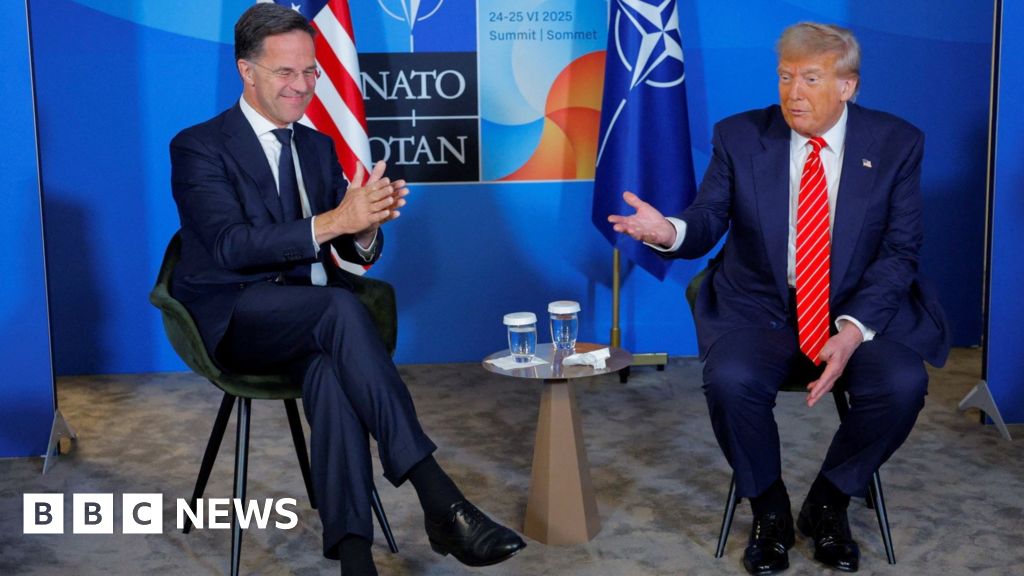Nato's secretary-general Mark Rutte appeared to approve of the language previously used by the US president about Israel and Iran. During a press briefing in the Netherlands, Rutte and Trump discussed the conflict between the two countries. Referencing Trump's use of an expletive on Tuesday, Rutte said: "And then daddy has to sometimes use strong language." Readlive updateson the Israel-Iran war. Lyse Doucet reports from the streets of Tehran, where she says things are staring to return to normal. Emergency workers raced to clear rubble from the site of an Iranian missile attack in the Tel Aviv. Videos posted on social media show queues for fuel and gridlocked traffic as people try to leave Tehran. The BBC's Middle East correspondent Hugo Bachega is in Petah Tikva, where an Iranian missile struck a building overnight. Five people have been killed and dozens injured, according to Israel's national emergency service. Footage from Reuters news agency and The Associated Press shows burning cars after a missile strike in the Israeli city of Haifa. BBC correspondent Hugo Bachega reports from Bat Yam near Tel Aviv which has been targeted by Iran. Israel and Iran have continued to attack each other throughout the night Emergency services in the Israel's of Bat Yam launch rescue efforts following Iran strike. Israeli authorities have indicated that this could be the beginning of a prolonged campaign against Iran. The BBC's Hugo Bachega reports from Jerusalem as the two sides trade fire. Iran launched a fresh wave of missiles towards the country on Friday night, vowing to "inflict heavy blows". Israel's wave of strikes against Iran, which began on Thursday night, has continued through today. BBC Verify's Merlyn Thomas has been examining footage of the attacks and the damage they've caused. Israel's prime minister said Iran's nuclear capability posed a "clear and present danger", while Iran's president promised a "powerful" response. The BBC's Hugo Bachega reports from Jerusalem, after Israel launched overnight strikes against sites across Iran. Israeli Prime Minister Benjamin Netanyahu said in a video statement that Israel has launched Operation Rising Lion. Israel says it has carried out strikes on Iran's nuclear programme, with blasts and fires seen in Tehran and elsewhere. Palestinians can be seen climbing over fences and running to get humanitarian aid in the footage. The BBC heard from dozens of former officials about their role enforcing the brutality of the Assad regime. Onboard security footage from the Madleen aid vessel shows activists throwing their tech overboard and putting up their hands.
Watch: Nato boss calls Trump 'daddy' in handling of Israel-Iran conflict
TruthLens AI Suggested Headline:
"NATO Secretary-General Rutte Comments on Trump’s Language Regarding Israel-Iran Conflict"
TruthLens AI Summary
During a press briefing in the Netherlands, NATO Secretary-General Mark Rutte made headlines by echoing language previously used by former U.S. President Donald Trump regarding the ongoing conflict between Israel and Iran. Rutte referenced Trump's use of strong language, particularly an expletive, saying, "And then daddy has to sometimes use strong language." This remark highlights the complex dynamics of international diplomacy as Rutte appeared to show support for Trump's assertive stance on the conflict. The situation has escalated significantly, with Israel and Iran exchanging missile strikes, leading to casualties and destruction on both sides. Reports from BBC correspondents detail the aftermath of these attacks, with emergency workers in Israel responding to the destruction caused by Iranian missile strikes in cities like Tel Aviv and Haifa. Footage shows burning vehicles and damage to buildings, underscoring the severity of the conflict.
As tensions mount, Israel's Prime Minister Benjamin Netanyahu has declared a campaign named Operation Rising Lion, aimed at countering the perceived threat posed by Iran's nuclear capabilities. Israeli authorities are preparing for a prolonged confrontation, with missile strikes launched by Iran reportedly targeting various locations in Israel. The ongoing violence has resulted in civilian casualties, with five reported dead and dozens injured following the recent strikes. Meanwhile, in Iran, daily life is disrupted as residents scramble for fuel and attempt to flee the affected areas. Humanitarian concerns are also rising, as Palestinians are seen seeking aid amidst the chaos. International observers are closely monitoring the situation, which continues to evolve with each passing day, reflecting the deep-seated tensions between these two nations and the broader implications for regional stability.
TruthLens AI Analysis
You need to be a member to generate the AI analysis for this article.
Log In to Generate AnalysisNot a member yet? Register for free.
